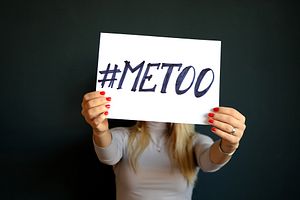In my view, every tiny change within China has an impact on the country’s behavior toward the rest of the world. Social tolerance and the public’s reaction have been increasingly taken into consideration when crafting many of China’s foreign policies in recent years. Therefore, anyone paying attention to China’s diplomacy must also keep a watchful eye on the changes in Chinese society. By doing so, I believe you will find a new channel to understand China’s foreign policy.
That brings me to today’s topic: China’s #MeToo Movement.
To be honest, at first I didn’t take any particular notice of this movement, which began in the United States. American female stars, including Alyssa Milano, promoted the movement as a response against Harvey Weinstein, a famous producer who has been accused of sexually assaulting women throughout his career. Surprisingly, however, China suddenly started its own #MeToo Movement this summer, and things exploded just this week. Over the past few days, more than 10 celebrities have been accused of having sexually harassed and even assaulted others. Even some of my friends were involved, which forced me to face up to the problem.
For example, well-known journalist Zhang Wen was accused of sexually assaulting a woman two months ago; he denied the charge and claimed he was framed. Later, another five women (including a famous Chinese writer) came forward and accused him of sexual harassment at different times and on different occasions on the internet, arousing widespread public concern. The accusations shook me to the core, as I had attended several events with Zhang and had previously had a good perception of him. I posted about this on social media (China’s Sina Weibo) and called for a legal investigation.
To my surprise, a female friend left a message under the post, asking me where she should go to file a complaint about a matter like that. I responded by asking her, “Have you been sexually harassed or assaulted?” She answered with hesitation that she was sexually harassed by a person at a “state news agency” during her internship. It’s been years since it happened and only her closest family knew about it.
Now she finally wanted to speak up — seeing so many women on the internet coming out to reveal their own experience of being sexually harassed and assaulted by “celebrities” gave her courage. I encouraged her to say it out loud so that the perpetrator would have nowhere to hide. She was hesitant to do so — maybe she just doesn’t want to revisit this painful experience in the past.
Yet even as I was writing this column, a post in which a girl exposed her experience of being sexually assaulted by a famous CCTV host during her internship went viral on the internet, making another contribution to China’s #MeToo Movement.
The reason I described China’s #MeToo Movement as sudden is because, in the past week, there has been surprising news coming out every day. Familiar faces are now being revealed as predators.
The #MeToo Movement in China first exploded in charity circles. The one place that has long been hailed as sacred by many people turned out to be a shelter of evil people and evil practices. Just days ago, Lei Chuang, a famous philanthropist, was accused of sexually assaulting a woman who had worked with him in 2015. He later made a statement admitting his mistake and considered turning himself in. But he said he was romantically involved with the woman at the time, which she denied. Then another woman came out and accused him of sexual assault. The Beijing police are now looking into the case.
Later, Feng Yongfeng, another philanthropist, was accused by several women of sexual harassment, assault, rape, and even death threats. Feng blamed it all on alcohol. Alcohol has become a cheap excuse for sexual harassment – Zhang Wen, the journalist mentioned above, also explained his inappropriate behavior by saying that “it’s normal for people to hug and touch each other while drinking together.” Of course, this excuse was overwhelmingly denounced by the public on the internet. Now Zhang Wen is said to be applying to emigrate to the United States and many netizens have left messages on the social media account of Beijing’s U.S. Embassy, asking them to keep an eye on this.
China’s #MeToo Movement isn’t just about female victims standing up to voice their experiences, though. Three men have revealed their experience of being sexually harassed by Zhang Jinxiong, head of a well-known homosexual charity organization in China. Ironically, it seems Zhang believes in the rule of law — he once consulted his lawyer about how Chinese law defines and punishes sexual harassment between men.
The Chinese #MeToo Movement keeps simmering, moving from the charity circle to the media sector. It’s a safe bet that there will be more “celebrities” with a dirty past exposed in the future.
In my opinion, this is an awakening movement for the Chinese people. They are waking up to protect their own rights and interests, which is not something that’s taught in school or at home. This is a voluntary social movement with a width and depth the likes of which we have not seen in decades.
Thanks to the social media boom in China, the right of speech is no longer only in the hands of state or elite-controlled TV, newspapers, and magazines. Narrative power has been dispersed to everyone’s mobile phone and tablet. It also shows that society is improving and the Chinese people are increasingly aware of — and protective of — their own rights. In the future, such awareness will drive China’s human rights approach to be more democratized and exert a subtle influence on China’s politics and economy, ultimately having a positive impact on the progress of the nation as a whole.
































